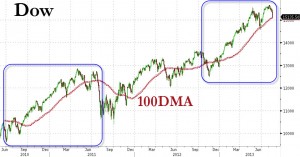Observing today’s global economy is like watching Adam Sandler’s best movie. It’s horrible, but it could be worse.
Consider what passes for improvement today:
Europe is no longer in a recession. Under the headline, “Eurozone’s longest-ever recession comes to an end,” the Associated Press quoted Eurostat, the European Union’s statistics office, announcing that the 17 EU countries that use the euro saw their economic output increase by 0.3% in the second quarter of 2013. Over a year, the Eurozone’s growth rate would be 1.1%.
That’s the first quarterly growth for the Eurozone since 2011, but it requires some perspective. China’s growth slowed to just 7% this year and it’s widely regarded as a calamity, signaling that the world’s second largest economy is on the brink of failure. Europe’s economy is growing at a rate of 1.1 % and the party hats are out because some believe that the Eurocrisis is finally over and we’ll never have to hear the term “sovereign debt” again.
Don’t count on it though. The Eurocrisis is far from over. Consider just a few unresolved issues outlined by Fidelity’s Michael Collins:
- Greece is ever closer to collapse, an event that would trigger bank and bond runs in other troubled countries.
- Mediobanca, Italy’s second-biggest bank, warned in June that the country might need an EU rescue within six months because the recession and the credit crisis for large companies are deepening, to the detriment of government finances.
- Italy’s politics will only become more unstable now that Italy’s supreme court has confirmed a jail term for former prime minister Silvio Berlusconi for tax fraud.
- Spain is another concern because Spanish yields rose to worrying levels in June as a scandal over slush funds prompted calls for Prime Minister Mariano Rajoy to resign.
- A eurostat release in July confirmed that austerity is boosting government debt-to-GDP levels to levels that could erode investor confidence.
- Italy’s ratio of government debt to GDP stood at 130% in March, Portugal’s was at 127% and Spain’s at 88%. (Greece’s debt level was at 161% of output.)
Those points are included in a lengthy analysis of European Central Bank Chair Mario Draghi’s fragile monetary scheme, which consists of purchasing unlimited amounts of bonds of distressed countries and balancing the purchase by selling securities from countries that are no longer struggling.
The scheme would be problematic if it were put in play, according to Collins, but it has not been, so it has worked well at boosting consumer confidence – for now.
U.S. Jobless Benefits Down. Meanwhile, in the U.S.A., employers fired the fewest workers since the Great Recession began almost six years ago.
As a result, the number of claims for jobless benefits dropped by 15,000 to 320,000 in the week the ended Aug. 10. That’s the lowest total since October 2007, according to U.S. Labor Department.
Again, this requires some perspective. The U.S. population, as of 2012, exceeded 313 million. The drop in the number of people who stopped receiving jobless benefits represents 0.0048% of the population. You could fit the entire group in one of the smaller suburbs of Cleveland.
The Federal Reserve Board has been purchasing $85 billion in bonds per month in an effort to reduce the unemployment rate. Assuming the 15,000 people who stopped receiving jobless benefits are now employed – and that’s a huge leap of faith – that amounts to the purchase of $566,666.67 in bonds for each person who has stopped receiving jobless benefits.
At that rate, The Fed would have to buy only $1,813,333,333,333,333 in bonds to cover the 320,000 Americans newly filing for jobless benefits last week.
Yet, in this age of lower expectations, this passes as good news. No wonder consumer confidence was close to a five-year high last week!
Meanwhile, an Associated Press survey found that four out of five U.S. adults are struggling with joblessness, near-poverty or reliance on welfare for at least parts of their lives.
A few years ago, someone said that “flat is the new growth.” That continues to be the case today.

